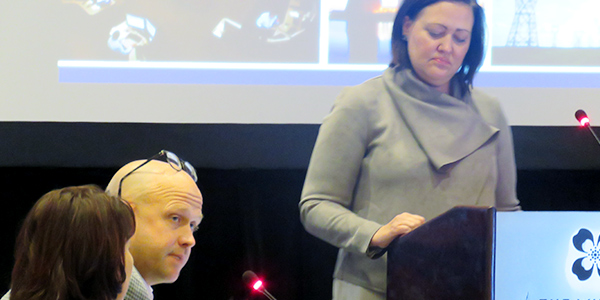ATLANTA — Below is a summary of actions taken by the NERC Board of Trustees at its meeting Tuesday.
SERC Bylaw Changes OK’d
The board approved amendments to SERC Reliability’s bylaws to change its governance structure effective Jan. 1, 2021.

SERC CEO Jason Blake and General Counsel Holly Hawkins briefed the NERC board on its revised bylaws. | © ERO Insider
The amended bylaws:
- change the Board Executive Committee into a full hybrid board, including stakeholder and independent directors;
- add at least three independent directors to the Board of Directors;
- formalize SERC’s membership body to include a representative from each member company by transitioning the existing full board into a members group that will meet at least annually to advise the board on the business plan and budget, elect independent directors and approve bylaw changes, as needed;
- change the Board Compliance Committee into the Board Risk Committee; and
- add a Human Resources and Compensation Committee, a Nominating and Governance Committee, and a Finance and Audit Committee.
Howard Gugel, NERC | © ERO Insider
It “changes almost everything,” SERC General Counsel Holly Hawkins said of the revised bylaws, which were approved unanimously by the regional entity’s board last month.
SERC CEO Jason Blake called the new rules “transformational.”
NERC Chair Roy Thilly called it a “very positive development,” noting that all REs will now have hybrid boards.
“This moves SERC to the front of the pack in terms of good governance,” Trustee Fred Gorbet said.
ReliabilityFirst Bylaw Changes Approved
The board approved changes to ReliabilityFirst’s governance and oversight guidelines to:
- modify the CEO and independent director compensation approval process;
- appoint a lead independent director to serve with an appointed stakeholder chair and vice chair;
- implement term limits for directors, consisting of four consecutive three-year terms;
- appoint the CEO as a non-voting, ex officio member of the Board of Directors; and
- require board approval for directors serving on more than five outside boards.
Committee Appointments

The board approved the following committee members:
- Personnel Certification Governance Committee: Cory Danson, Western Area Power Administration, as chair for a term of two years. Current Chair Michael Anderson, American Electric Power, did not seek reappointment because his position changed at AEP. Margaret Quispe, SPP, will continue as vice chair.
- Standards Committee: Amy Casuscelli, Xcel Energy, as chair, and Todd Bennett, Associated Electric Cooperative Inc., as vice chair for two-year terms.
- Critical Infrastructure Protection Committee: Marc Child, Great River Energy, chair; and David Grubbs, city of Garland, Texas, and David Revill, Georgia Systems Operations, co-vice chairs, for terms beginning Jan. 1. The remaining positions on the Executive Committee will be filled at the December meeting.
- Compliance and Certification Committee: three-year terms for Justin MacDonald, Midwest Energy, Cooperative Utility sector; Ashley Stringer, Oklahoma Municipal Power Authority, Transmission-Dependent Utility sector.
Approvals
The board approved:
- The 2020-2022 Reliability Standards Development Plan and authorized NERC staff to file it with applicable regulatory authorities. The three-year plan for reliability standards development addresses FERC directives, emerging risks and the Standards Efficiency Review.
- Reliability standard BAL-003-2 (Frequency Response and Frequency Bias Setting) and authorized its filing with FERC and other regulatory authorities. Howard Gugel, vice president of engineering and standards, said the revisions address inconsistencies identified in the Frequency Response Annual Analysis.
- PRC-006-NPCC2 (Automatic Underfrequency Load Shedding), which removes redundancies with PRC-006-1, PRC-006-2, PRC-024-1 and PRC-024-2.
Reliability Risk Priorities Report Approved

The board approved the ERO Reliability Risk Priorities Report, prepared by the Reliability Issues Steering Committee (RISC), which reflects the committee’s efforts to define and prioritize risks and recommend what NERC and industry representatives should do to manage them. The report adds a 10th risk — critical infrastructure interdependencies — to the nine previously identified. (See ‘Interdependencies’ Joins RISC’s List.)
RISC Chair Nelson Peeler said the report also was modified to make it “simpler [and] cleaner.” It also incorporates survey results, which “will allow us to better track and trend as we go year to year.”
“I think we have had much better alignment than in prior years,” he added.
2020-2022 Reliability Standards Development Plan Approved
The board approved the 2020-2022 Reliability Standards Development Plan (RSDP) and authorized NERC staff to file it with applicable regulatory authorities. The plan seeks to address FERC directives, emerging risks and the Standards Efficiency Review.
– Rich Heidorn Jr.




